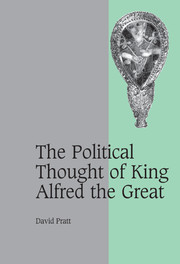Book contents
- Frontmatter
- Contents
- Acknowledgements
- List of abbreviations
- Note on citations
- Chapter 1 INTRODUCTION
- Part I The West Saxon Political Order
- Chapter 2 RESOURCES AND EXTRACTION
- Chapter 3 ROYAL LORDSHIP AND SECULAR OFFICE-HOLDING
- Chapter 4 ROYAL LORDSHIP AND ECCLESIASTICAL OFFICE-HOLDING
- Chapter 5 THE ARTICULATION OF POWER UNDER KING ALFRED'S PREDECESSORS
- Chapter 6 THE IMPACT OF THE VIKINGS
- Part II Alfredian Discourse and its Efficacy
- Appendix: West Frankish deployment of Solomon's dream
- Bibliography
- Index of manuscripts
- General index
- Cambridge Studies in Medieval Life and Thought Fourth Series
Chapter 5 - THE ARTICULATION OF POWER UNDER KING ALFRED'S PREDECESSORS
Published online by Cambridge University Press: 06 July 2009
- Frontmatter
- Contents
- Acknowledgements
- List of abbreviations
- Note on citations
- Chapter 1 INTRODUCTION
- Part I The West Saxon Political Order
- Chapter 2 RESOURCES AND EXTRACTION
- Chapter 3 ROYAL LORDSHIP AND SECULAR OFFICE-HOLDING
- Chapter 4 ROYAL LORDSHIP AND ECCLESIASTICAL OFFICE-HOLDING
- Chapter 5 THE ARTICULATION OF POWER UNDER KING ALFRED'S PREDECESSORS
- Chapter 6 THE IMPACT OF THE VIKINGS
- Part II Alfredian Discourse and its Efficacy
- Appendix: West Frankish deployment of Solomon's dream
- Bibliography
- Index of manuscripts
- General index
- Cambridge Studies in Medieval Life and Thought Fourth Series
Summary
The articulation of power under Alfred's predecessors is a subject of potentially the utmost importance, as the context for all Alfredian developments, yet it is also problematic, given the paucity of earlier surviving sources. Evidential problems are pressing in view of the learned, textual, character of Alfredian ‘capital’, heavily invested in the philosophical exploration of kingship and authority. Directly pertinent is the extent of earlier reliance on the written word, but one must also be alive to other media, and the respective roles of speech, gesture and ritual. Though frustrating, the partial nature of access can be mitigated in several ways: through Continental comparison, and by evaluating and juxtaposing different types of source material.
COLLECTIVE OFFICE-HOLDING: WEST SAXON ROYAL DEVOTION
The best attested form of ‘cultural capital’ under Alfred's predecessors was devotional; the royal household was not the only focus, but its practices held unique significance. Ecclesiastical communities had long provided aristocratic kindreds with local sources of sacrality; patterns of gift-giving sustained strong traditions of lay piety. What distinguished ‘royal’ activity was the centrality of the king; in his presence, devotional activity was transformed into a potent medium for royal communication. This is an area in which Carolingian influence may have been especially strong; its meaning and significance must be considered in West Saxon context.
Alfred's own piety bears many hallmarks of contemporary Carolingian practice. Though his practice was extreme, many aspects find earlier West Saxon parallels.
- Type
- Chapter
- Information
- The Political Thought of King Alfred the Great , pp. 63 - 92Publisher: Cambridge University PressPrint publication year: 2007

